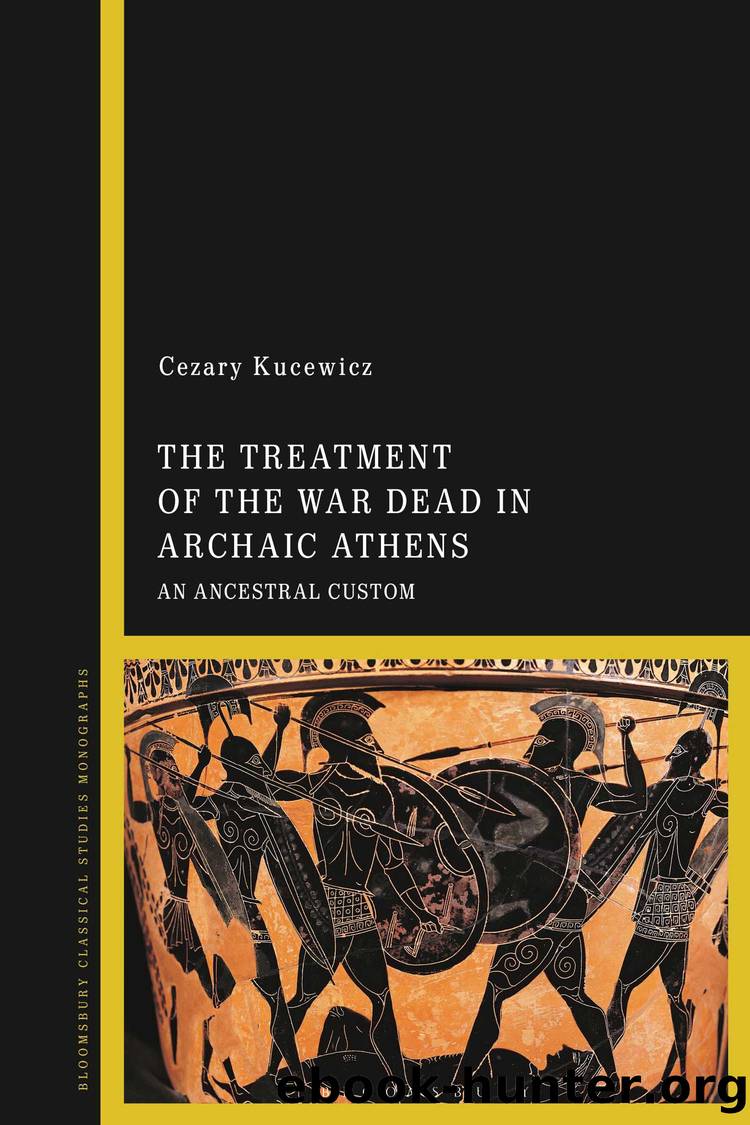The Treatment of the War Dead in Archaic Athens by Kucewicz Cezary;

Author:Kucewicz, Cezary; [Kucewicz, Cezary]
Language: eng
Format: epub
Publisher: Bloomsbury Publishing Plc
Published: 2020-10-08T00:00:00+00:00
Peisistratusâ tyranny
Solonâs constitutional reforms left a mark on the social and political structures of early Athens, setting in motion a number of processes which increased the public authority and control over its citizens, impacting the long-term growth of the Athenian state. His reforms, however, apparently did little to establish short-term peace in the polis, as conflicts among the elites brought the city to a renewed state of turmoil. According to Aristotleâs account, in the years following Solonâs reforms the Athenians twice failed to appoint an archon, and had to remove Damasias by force, on account of him keeping the office beyond his tenure ([Ath. Pol.] 13.1â3). In general, the city was in a state of continuous internal disorder, as the people âwere always engaging in party strifeâ for the office of the archon.
The party strife (stasis) which dominated in Athens in the early decades of the sixth century BC is indeed mentioned by a number of other sources, providing further testimony to the resentment which Solonâs legislation must have evoked among the Athenian elites.82 The subsequent division into three separate political factions according to geographical region: âthe men of the Coastâ, âthe men of the Plainâ and âthe party of the Hillmenâ, has caused a lot of controversy among modern scholars trying to establish the political ideologies and social backing behind each party.83 One thing which remains clear, however, is that there was a definite winner at the end of the conflict, namely Peisistratus, the leader of the Hillmen party, who seized power and became the tyrant of Athens. The tyrannical rule which he started and later passed on to his sons lasted for nearly half a century, stabilized the political situation in Athens and brought economic prosperity to the majority of citizens, leading Aristotle to describe it as âthe Golden Age of Cronusâ in Athens ([Ath. Pol.] 16.7).
Peisistratusâ early rise to power is vaguely documented by Herodotus, who mentions that he distinguished himself in the war against Megara, performing âgreat deedsâ during the Athenian capture of Nisaea (1.59).84 The long conflict with the Megarians for the possession of Salamis and Eleusis began, as we have seen, in the second half of the seventh century BC and continued through the Cylonian affair and the reforms of Solon, with the initiative swinging repeatedly from one side to another. But taking control of the Megarian port of Nisaea sometime in the 560s BC, proved to be the final and decisive victory, ending the war in Athensâ favour.85 Both Herodotus and Aristotle indicate that the credit for the ultimate victory was given almost entirely to Peisistratus, who served as a military commander in the army, establishing himself as one of the most popular and widely respected men in Athens (Hdt. 1.59; [Ath. Pol.] 14.1).86 It was on the back of his military success that Peisistratus twice attempted to seize tyrannical power: first, with the support of a small group of men carrying clubs who, through trickery, he persuaded the Athenians to grant him as personal guard; and then by making an alliance with Megacles, the head of the Alcmaeonid family.
Download
This site does not store any files on its server. We only index and link to content provided by other sites. Please contact the content providers to delete copyright contents if any and email us, we'll remove relevant links or contents immediately.
| Africa | Americas |
| Arctic & Antarctica | Asia |
| Australia & Oceania | Europe |
| Middle East | Russia |
| United States | World |
| Ancient Civilizations | Military |
| Historical Study & Educational Resources |
Magic and Divination in Early Islam by Emilie Savage-Smith;(1474)
Ambition and Desire: The Dangerous Life of Josephine Bonaparte by Kate Williams(1304)
Bohemians, Bootleggers, Flappers, and Swells: The Best of Early Vanity Fair by Bohemians Bootleggers Flappers & Swells- The Best of Early Vanity Fair (epub)(1285)
Papillon by Henry Charrière(1269)
Twelve Caesars by Mary Beard(1177)
Operation Vengeance: The Astonishing Aerial Ambush That Changed World War II by Dan Hampton(1116)
What Really Happened: The Death of Hitler by Robert J. Hutchinson(1098)
London in the Twentieth Century by Jerry White(1076)
Time of the Magicians by Wolfram Eilenberger(1051)
Twilight of the Gods by Ian W. Toll(1048)
The Japanese by Christopher Harding(1042)
Lenin: A Biography by Robert Service(1007)
The Devil You Know by Charles M. Blow(956)
Freemasons for Dummies by Hodapp Christopher;(898)
A Social History of the Media by Peter Burke & Peter Burke(888)
Napolean Hill Collection by Napoleon Hill(870)
Henry III by David Carpenter;(869)
The Churchill Complex by Ian Buruma(863)
The Rise and Triumph of the Modern Self by Unknown(860)
